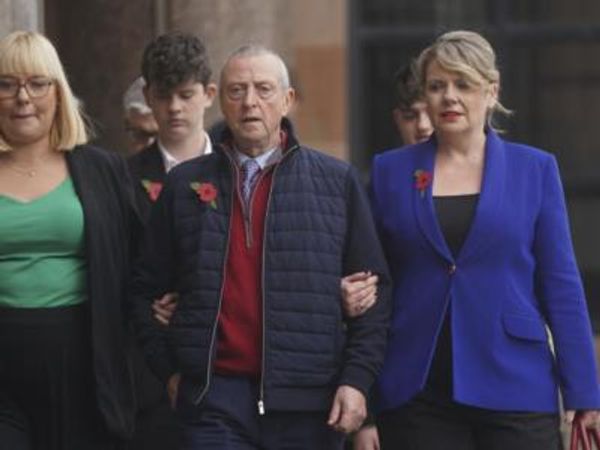
POTENTIAL ENERGY
A tech billionaire wants to buy AGL for $10 billion and make it go green by 2030, the SMH reports. Mike Cannon–Brookes, who founded software company Atlassian, joined forces with a fund manager called Brookfield in proposing the takeover — but the paper says the proposal’s 4% premium on the $7.16 share price isn’t good enough for the board to greenlight it. Interestingly, The Australian ($) adds, Brookfield has a near 50% stake in Queensland’s giant Dalrymple Bay Coal Terminal.
So what does Cannon-Brookes want with the energy titan? First, to accelerate the closure of its coal-fired power stations 15 years ahead of schedule, and also to commit to audacious emission targets. AGL’s power stations are Australia’s biggest single source of planet-heating greenhouses gases — they spew out 8% of our total emissions, Guardian Australia continues. So what happens now? The board held a meeting last night and are making an announcement at the stock market this morning.
It comes just days after the Morrison government’s “bitterly” disappointed reaction to the closure of coal plant Eraring in Lake Macquarie. But the government’s NSW counterpart isn’t wasting time — at the weekend, NSW Treasurer Matt Kean revealed a new plan that’ll create 3700 jobs in clean industries to relocate staff affected by the quicker closure, Guardian Australia reports. NSW’s Coalition will also put $250 million towards wind towers, electrolysers, and batteries in what Kean hopes will be a “manufacturing renaissance” in the state.
ON THE FLY
Australia’s international border will reopen today for the first time in 704 days. ABC has a cracking story this morning that delves into the saga — beginning with the unprecedented move to shut Australia off from the world in March 2020, even though just under half of us have at least one parent born overseas or were born overseas ourselves. But from today fully vaccinated international travellers can come to Australia without quarantining (citizens and permanent residents were allowed to come home in November, while visa holders and international students followed a couple weeks later). Prime Minister Scott Morrison says our travel is “going from COVID cautious to COVID confident”, Guardian Australia reports, with 56 international flights landing in Australia during the next 24 hours. It could see more than a million people arrive here in the coming months, The Australian ($) adds.
Also this morning, we need 200,000 or more migrants a year, according to economists. Of 49 economists who took part in the Economics Society of Australia poll, The New Daily reports, 37 of them said we need to boost our current target of 160,000, made by Morrison in March 2019 to manage city congestion. Economists say it’d allow us to fill labour gaps, increase the government’s tax take net of spending and just overall help foster a more interesting society, as The Conversation writes. And raising the target works — in the five years it was at 190,000 last decade, we actually welcomed that many. Compare that to our measly refugee target of 13,750 which is more like “a ceiling”, according to the Refugee Council of Australia.
IN A BAD LIGHT
Prime Minister Scott Morrison has condemed a laser incident last week as “reckless”, “irresponsible”, “unprovoked”, and “an act of intimidation”, Guardian Australia reports. To recap — last Thursday Australia’s defence department noticed a weird laser on a surveillance ship in the Arafura Sea (between Australia and the Island of New Guinea). Officials soon realised it was a military-grade laser coming from a People’s Liberation Army Navy vessel nearby that was passing through our exclusive economic zone.
So what’s the big deal? Well, as The Conversation explains, lasers are usually used for the purpose of “painting a target” before firing artillery shells, machine guns, or missiles. John Blaxland writes that it’s a hostile act, “the closest an attempt at military intimidation by China has gotten to our shores”. So why did China do this? Blaxland says it could be to send a message to Canberra that its naval patrols in the contested South China Sea are unwelcome. Morrison says he’ll make our views on the laser “very clear” to the Chinese government through our defence and diplomatic channels, and demand an explanation. But the Australian Strategic Policy Institute’s Peter Jennings told The Australian ($) it shows China is not willing to cooperate with us.
Labor’s opposition treasury spokesperson Jim Chalmers agreed with Morrison’s strong reaction but did point out last week’s antics — which attracted a rare rebuke from ASIO boss Mike Burgess — likely undermined our national security. Indeed Liberal Senator James Paterson rebuked Defence Minister Peter Dutton about referring to classified information during last week’s brawl of words, as Guardian Australia reports.
ON A LIGHTER NOTE
We’re nearing the end of February, and those shiny new year resolutions to drink less, move more, sort out the scary linen cupboard, and wash the dog with the expensive stuff may have fallen by the wayside in the flurry of life. No matter — you can easily get back on track, CNN’s Stephanie Mansour says. First — assess what went wrong. It’s easy to get lost in a vague resolution, like eating healthier or waking up a bit earlier. Get specific about when, where, and how you’re going to do it. Second — course correct. Breaking the goal into specific goals can help, so why not aim to wake up at 7am for two weeks, 6am for two weeks and then (oh, the horror) 5am? Or maybe you’re going to cook a dish on Sunday as meal prep for the week’s lunches.
Three — redefine your goals. This means thinking about how good you’ll feel when you start living your resolution, like seeing the sunrise or digging into your lovingly prepared lunch, to create an emotional bond. Four — reward yourself for the mini-goals, where you give yourself a pat on the back for making any sort of change. “Success breeds success, so celebrating your mini accomplishments will help keep the momentum going toward your bigger goals”, Mansour says. And five — track your progress however you prefer: journaling, using a goals-based app, or even ticking a kitchen calendar. “If you’re having a bad day and feeling down, you can look back at the progress you’ve made and convince yourself to keep going,” she writes.
Wishing you a little spring in your step today.
SAY WHAT?
It’s no surprise that demand remains for Australia’s coal — it’s some of the highest quality in the world. It is the royalties paid to state governments and the taxes paid by resources workers that pay for the essential services Australians rely on. And unfortunately, it also funds the fantasy the NSW treasurer has recently announced that an almost 3000-megawatt power station can be replaced by a battery.
Keith Pitt
The federal resources minister scored an own-goal against his team when he lashed out at the treasurer of the NSW Liberals yesterday — somewhat of an incorrect statement anyway, as Matt Kean has already confirmed the state would be “unlocking existing supply”, having discussed coal-fired power station Eraring’s closure for six months unbeknownst to the federal government.
CRIKEY RECAP
Sick, paranoid, poorer and disorganised: the aftermath of the Convoy to Canberra protests
“Ostensibly, the Convoy to Canberra was a failure because protestors didn’t get what they asked for. The five demands created by one of the major Telegram channels used to organise the protests — which included dismissing all members of Parliament; ending all vaccine mandates and state emergency powers; and opening all borders — were not accomplished.
“Nor were other objectives voiced by the more extreme and fringe attendees, some who spoke of vaguely violent demands. Protesters didn’t seem to mind.”
EXCLUSIVE: Beijing backs Morrison for PM
“The Chinese Communist Party’s propaganda outlet The Global Times has published a series of articles endorsing Liberal Party leader Scott Morrison, Crikey can reveal.
“The government-owned publication, which stridently promotes the Chinese Communist Party line, has praised* Morrison’s ‘deep understanding and unambiguous perception’ as well as his ‘Confucian wisdom’.”
COVID? What COVID? Virus virtually forgotten as Coalition goes the full McCarthy
“But with the wave receding, and given Australia’s vaccination rate and COVID fatalities remain the envy of much of the world, the pandemic — usually such a boost for incumbents — should be an electoral asset for the Coalition.
“That it currently isn’t speaks to how much the government has managed to erode public trust in its ability to do things competently, and to how many in the community believe Australia’s COVID success is in spite of Morrison’s leadership, not because of it.”
READ ALL ABOUT IT
Ethiopia starts electricity production at Blue Nile mega-dam (Al Jazeera)
Beijing ends a Games marked by triumph, heartbreak and scandal (The New York Times)
The Queen tests positive for COVID (BBC)
Bitcoin miners revived a dying coal plant — then CO2 emissions soared (The Guardian)
Why Apple, Amazon and Google are uniting on smart-home tech: Matter explained (The Wall Street Journal)
Nigeria’s looted Benin bronzes returned more than 100 years later (Al Jazeera)
Shooting at a Portland protest against police violence leaves 1 dead (The New York Times)
For the first time in more than three weeks, quiet in downtown Ottawa (CBC)
THE COMMENTARIAT
Pride in our education work defies barbed reporting — Noel Pearson (The Australian) ($): “There are three contentions underlying the Herald’s attack. The first is the commonwealth Education Department advised against funding the organisation I co-chair, Good to Great Schools Australia. Chrysanthos relies on a briefing note including a draft letter the department advised the minister in late 2019 to send to me.
“The circumstance was that a three-year trial of direct instruction literacy support to 40 remote schools — Indigenous and non-Indigenous — from 2015 to 2017 had ended. It was extended for 20 schools in 2018 and 10 schools in 2019. The evaluation by Melbourne University was not yet finalised and would not be until the following year. In the meantime 10 schools were depending on support. They would be left in the lurch if then education minister Dan Tehan had not extended the program for another year.”
The Trojan Horse Affair: how Serial podcast got it so wrong — Sonia Sodha (The Guardian): “Serial is one of the most downloaded podcasts in the world. Its first season, a true-crime whodunnit that became an instant hit had me hooked on its release eight years ago. So I was excited to tune into its new offering with The New York Times, The Trojan Horse Affair, an eight-part series that promises to tell the real story of the anonymous letter sent to Birmingham city council in 2013, that alleged a plot to take over and run local state schools according to strict Islamist principles.
But this latest series skewers the art of narrative journalism Serial is widely considered to have pioneered. Long-form podcasts have more blockbuster potential than straight-up reporting, but are laced with danger: the temptation to cherry-pick facts in service of a gripping story. The Trojan Horse Affair presents a one-sided account that minimises child protection concerns, misogyny and homophobia in order to exonerate the podcast’s hero, a man called Tahir Alam.”
HOLD THE FRONT PAGE

WHAT’S ON TODAY
Online
-
The Digital Health Summit (February 21–22) begins, which will explore clinical informatics, pandemics and public health, and digital hospitals.
Eora Nation Country (also known as Sydney)
-
Trains could be delayed this morning as Sydney rail workers are planning a strike over safety provisions.
Whadjuk Noongar Country (also known as Perth)
-
Perth Festival continues, with a curated multi-art program including comedy, performance art, music, and more.










